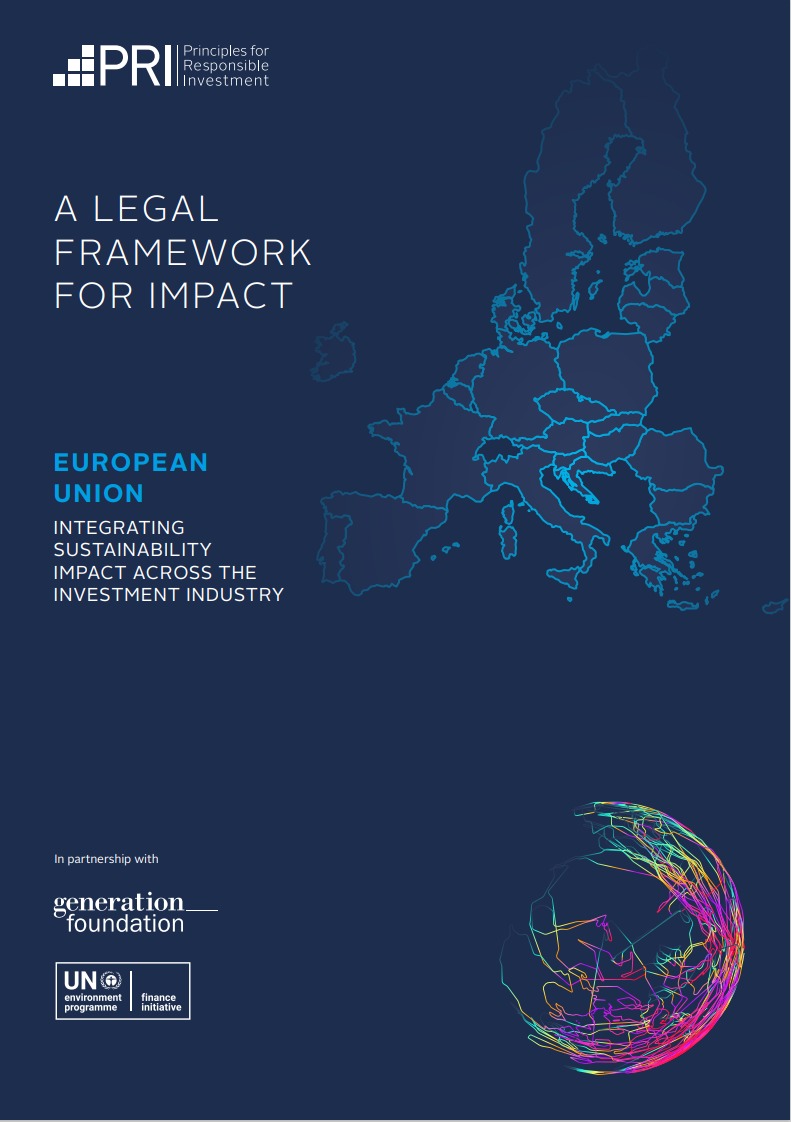
An analysis of relevant EU rules, and policy recommendations to encourage a wider pursuit of environmental and social goals
A wave of policy actions by the European Union in recent years has given investors a major role to play in the bloc’s transition to a sustainable economy. Emerging policies, laws and tools pave the way for a wider pursuit of sustainability impact goals by investors – but they are still not sufficient to bring the EU significantly closer to its environmental and social goals, be it through increased capital flows towards sustainable activities or stewardship driven by sustainability concerns.
Additional measures are needed to enable more asset owners and asset managers to pursue environmental and social impact goals – an approach called “investing for sustainability impact” (IFSI) in A Legal Framework for Impact (LFI), a report authored by Freshfields Bruckhaus Deringer and commissioned by the PRI, the United Nations Environment Programme Finance Initiative and the Generation Foundation.
The report, published in July 2021, surveyed 11 jurisdictions around the world, including the EU, aiming to answer the following question: are investors permitted or required to target positive sustainability impacts in the way they invest and manage their portfolios, including through stewardship? In other words, are they allowed or required to engage in IFSI?
The authors found that investors are likely to have a legal obligation to consider engaging in IFSI where it can help pursue their financial objectives (instrumental IFSI) and that, in some circumstances, investors can pursue sustainability goals for reasons other than achieving financial goals and in parallel with them (ultimate ends IFSI).
Building on the findings of the LFI report relating to the EU, this paper sets out why legal changes are needed to enable mainstream investors to work towards sustainability impact goals.
EU law still limits investors’ ability to invest or exercise stewardship in alignment with social and environmental goals, except where it is also financially beneficial to do so. In addition, existing duties may be understood in ways that result in investors not considering pursuing sustainability impact goals even where those align with discharging their duties to pursue financial return.
As a result, there is a potential inconsistency between EU financial regulation and wider EU sustainability goals. It may therefore be necessary to (1) clarify that existing duties may require or permit the pursuit of positive sustainability impacts by investors, especially in the case of instrumental IFSI; (2) remove legal barriers that impede investors from pursuing positive sustainability impacts more broadly; and (3) provide clarity on the appropriate mechanisms for investors to consider pursuing such impacts.
To create greater alignment across the EU framework in a number of these key areas, this paper presents recommendations developed by the PRI. Further work would need to be undertaken by the European Commission to determine how they should be implemented.
Policy recommendations: measures to embed the pursuit of positive sustainability impacts in fiduciary duties and other rules
Clarify, within the “prudent person” principle, when sustainability impact goals must or can be considered and develop implementation guidance
Clarify beneficiaries’ “best interest” to take into account sustainability impact goals
Gather and reflect beneficiaries’ and clients’ preferences as to whether their money should be used to achieve positive sustainability impacts
Clarify the relationship between financial and sustainability objectives
Other areas to explore: barriers to investing for sustainability impact and potential tools for removing them
Directors’ duties
Barriers to stewardship
Sustainability impact-focused investment products
Due diligence
The paper also contains detailed analysis of relevant EU rules for pension funds, the management companies of Undertakings for the Collective Investment in Transferable Securities (UCITS), insurance undertakings and investment managers.
